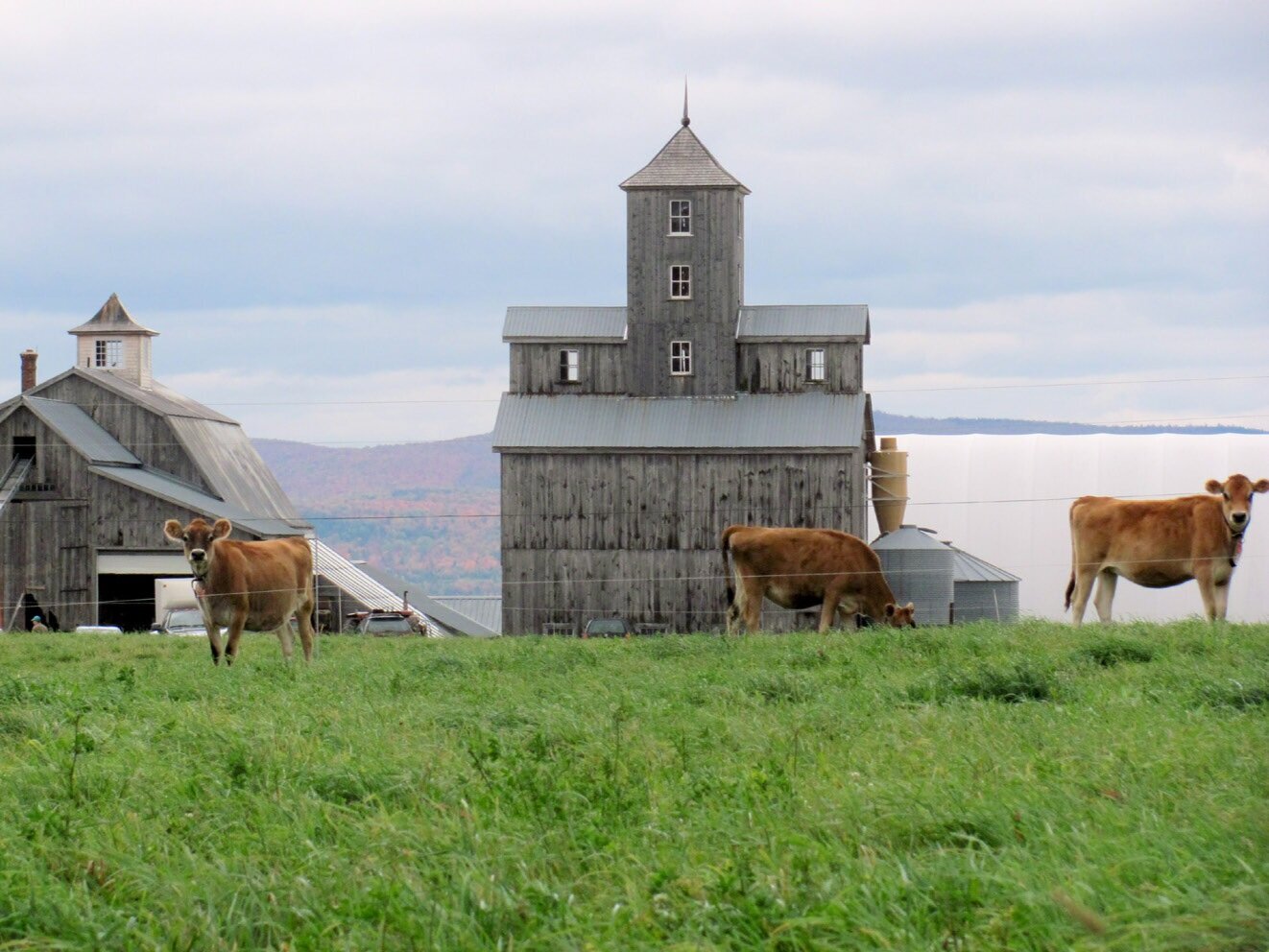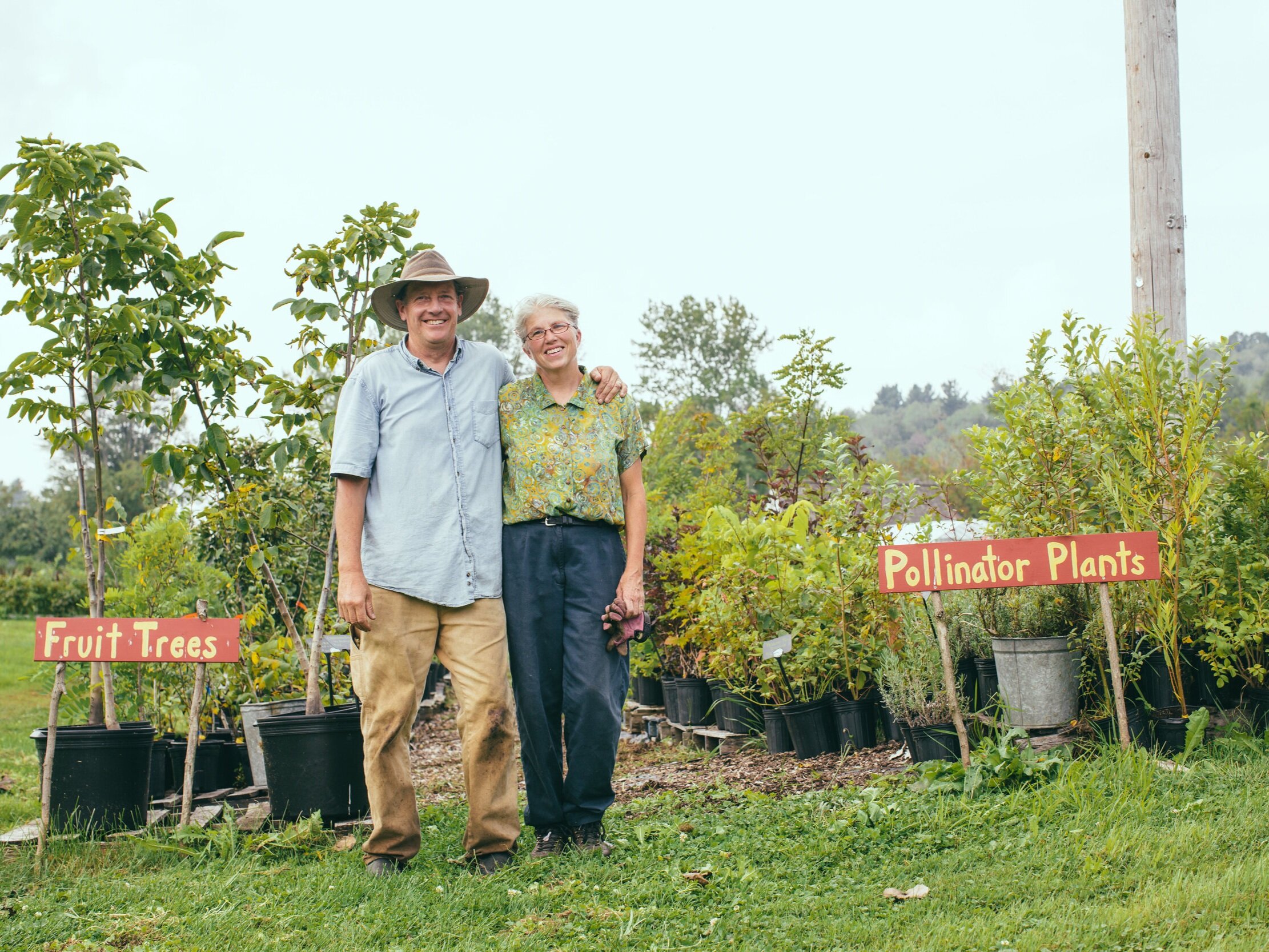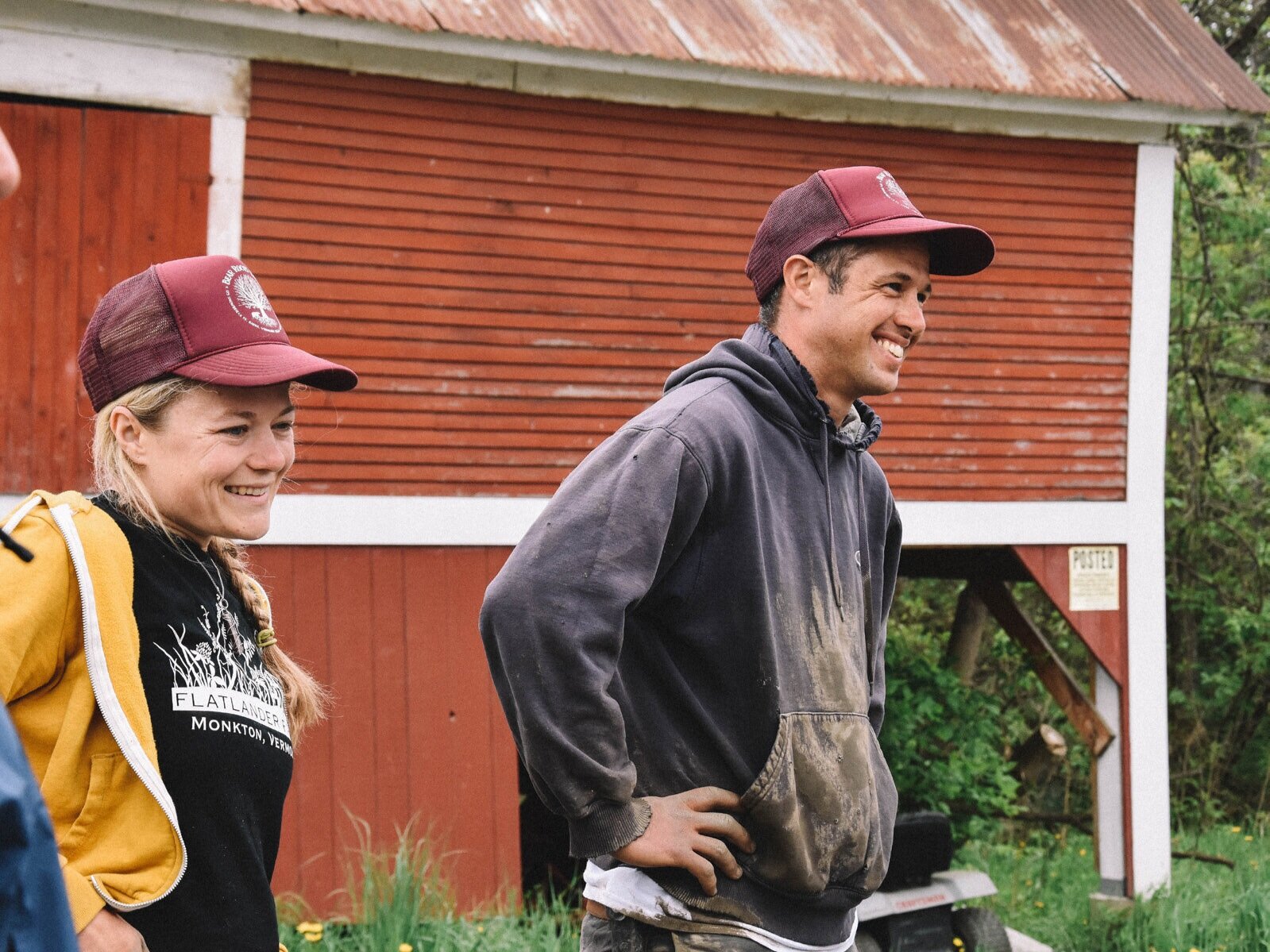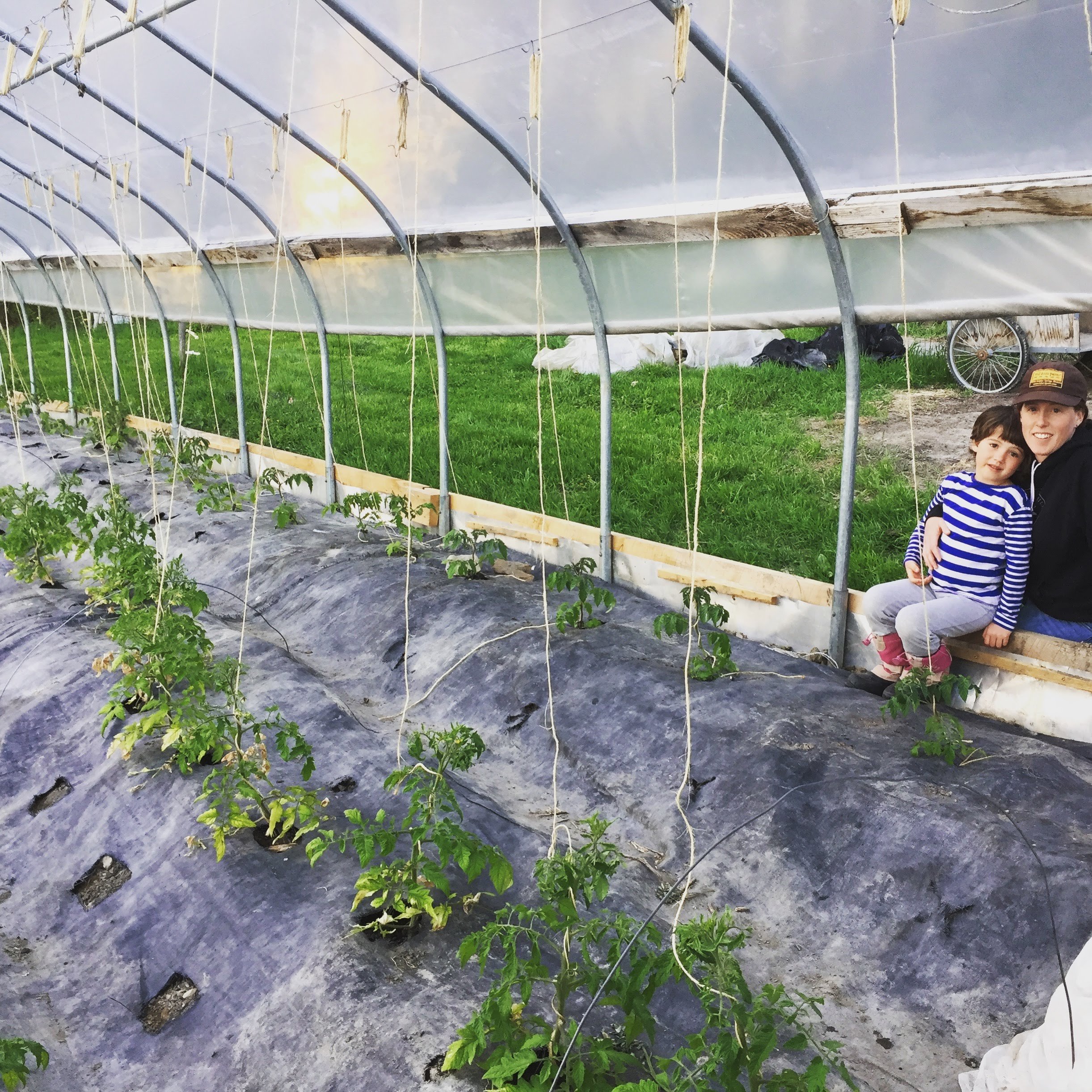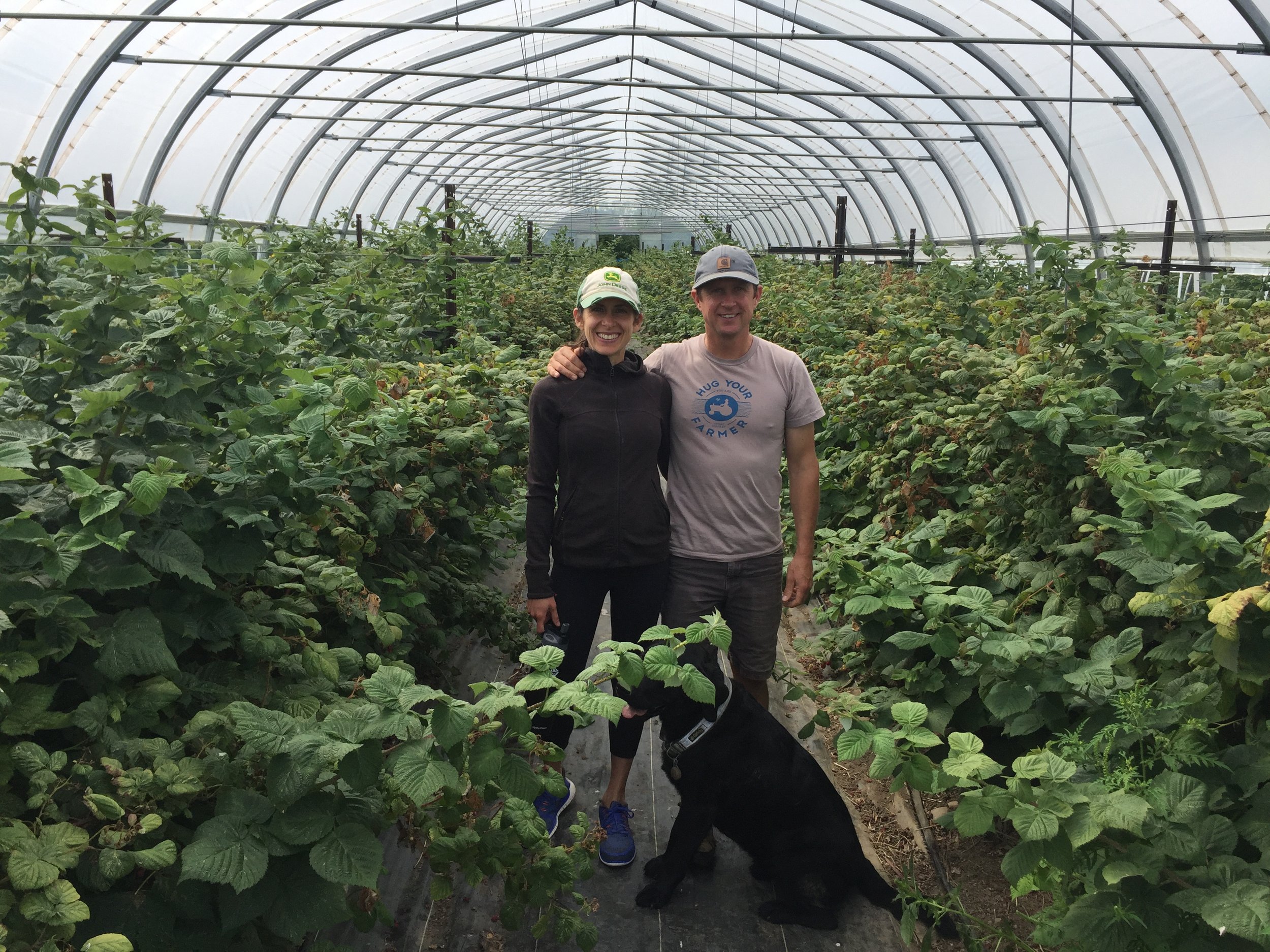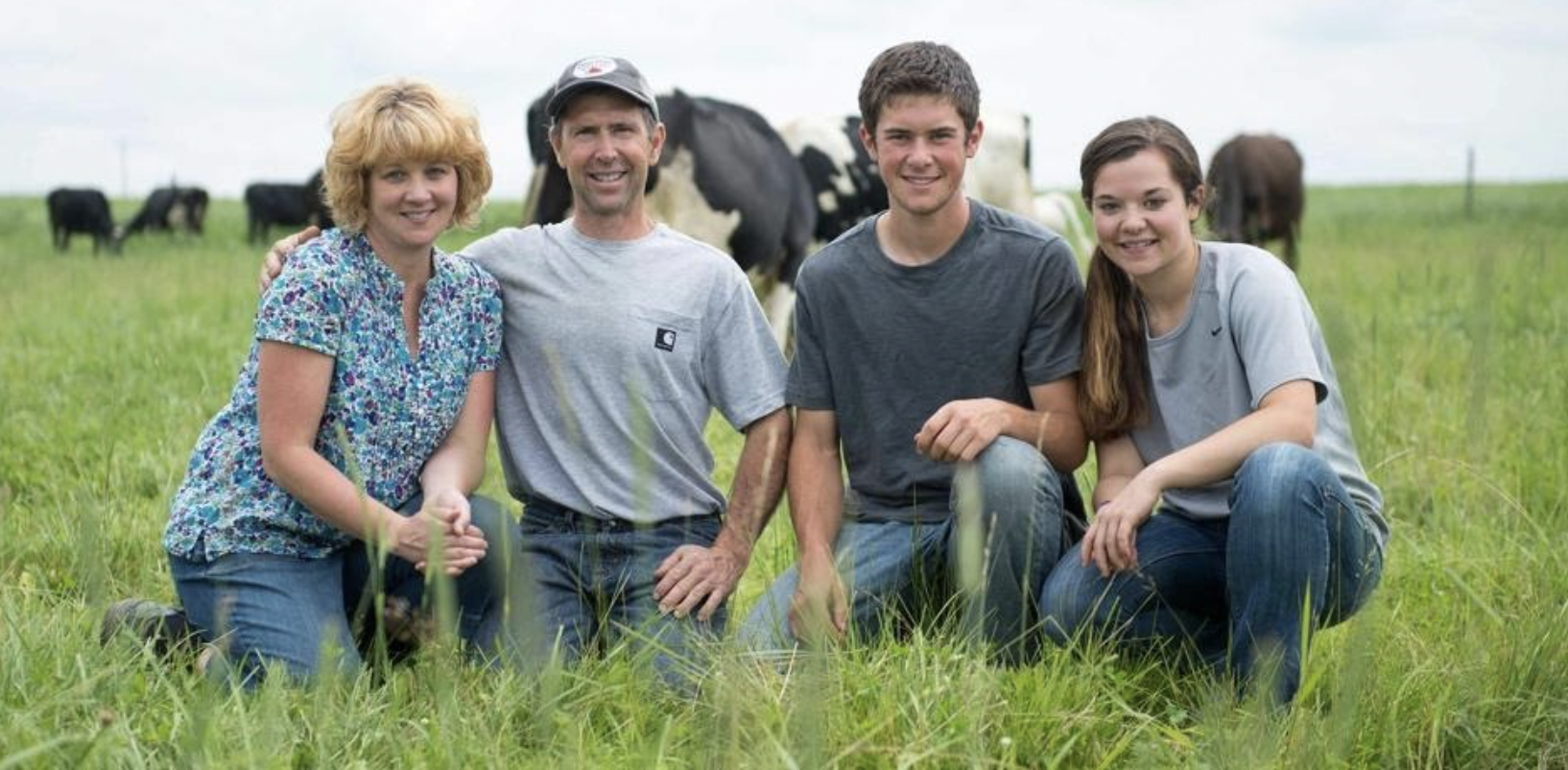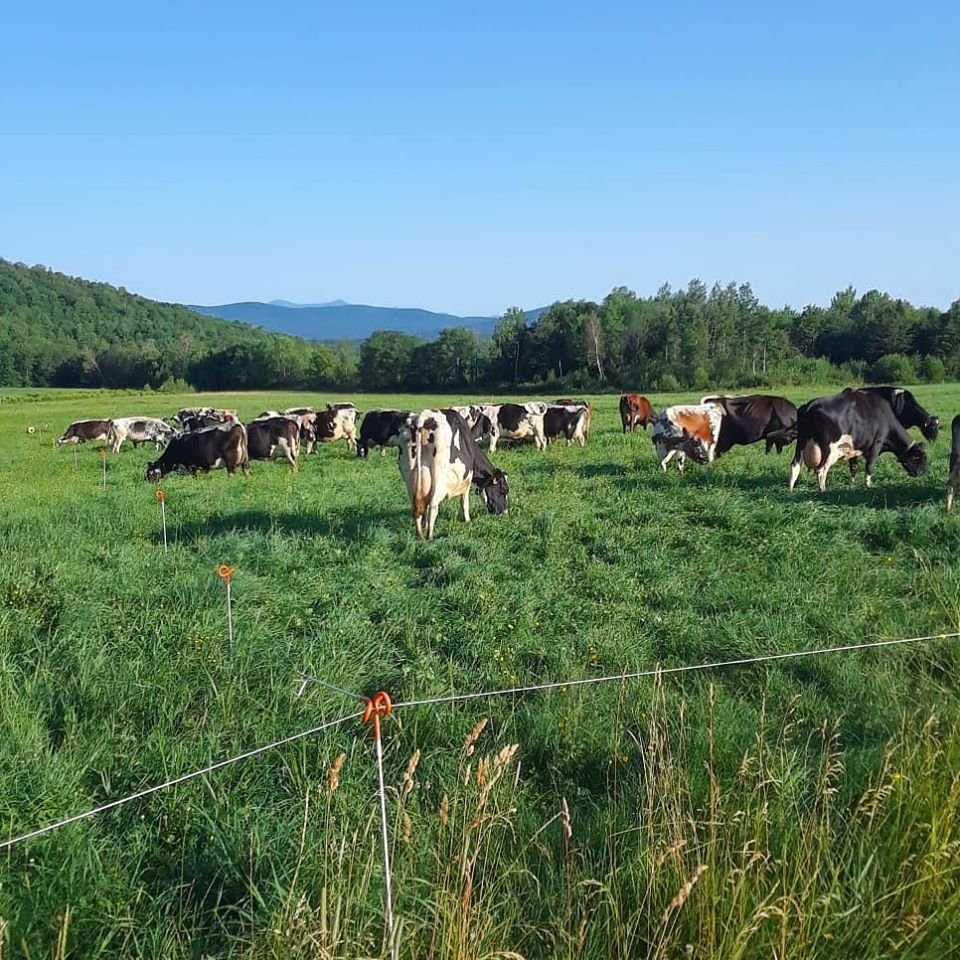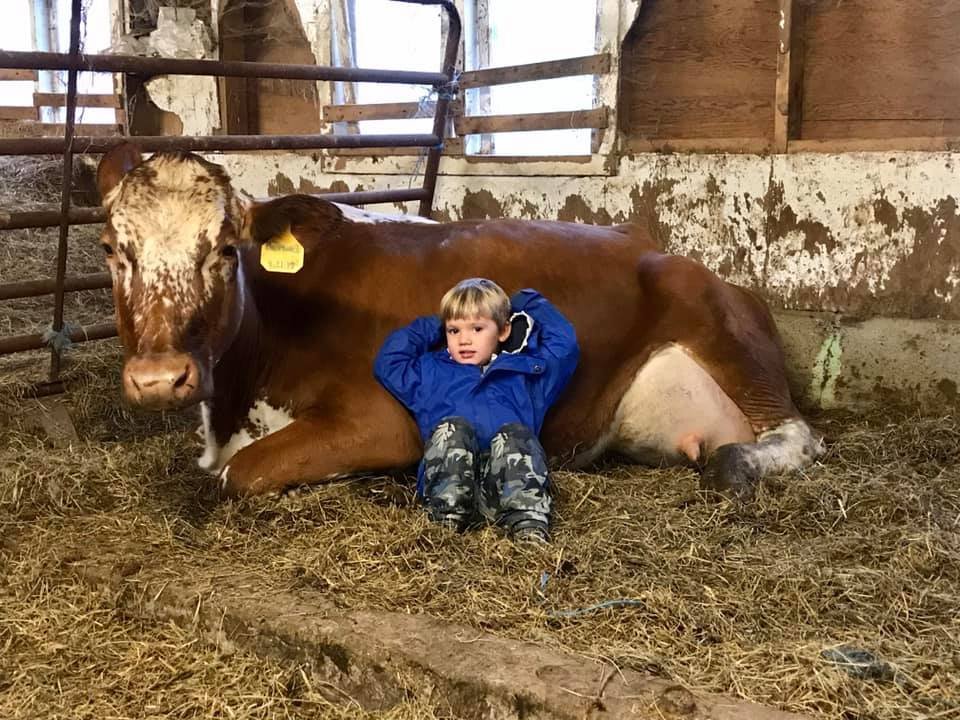Funded Projects
Bestyfield Farm
Project: Tractor Purchase & Truck Retrofit
With a grant of $12,500 from the Vermont Family Farmer of the Month fund, Ben Butterfield purchased a mid-size tractor with a bucket to better manage bedding and compost it for application to the surround pastures. In addition, Betsyfield used funding from the VFFM award to retrofit a truck for egg deliveries and spent grain pickup.
Butterworks Farm
Project: Yogurt Room Repair & Efficiency
With their VFFM grant of $15,000, Butterworks Farm was able to meet an immediate need to repair the cement floor in their yogurt room to comply with health codes, which turned into an opportunity to re-arrange 35-year old yogurt room equipment for more efficient product flow and operation.
Strafford Organic Creamery
Project: Back-up Generator Purchase
Amy Huyffer & Earl Ransom of Strafford Organic Creamery used their grant of $15,000 to purchase a back-up generator to run the entire creamery and milking barn. A couple of days after receiving the generator, there was a microburst and the creamery was forecasted to lose power for 4 days - luckily Amy and Earl were able to quickly install the generator and re-power the building. Now in any storm, they can be assured that be assured that the power won't go out, their equipment is not at risk for surges, they won't lose any sales or product, and their staff knows there will be reliable work.
Project: Retrofit Barn into New Farm Stand
Their previous farm stand was small and quaint but offered very limited products and was harder to locate. With a grant of $10,000 from VFFM, they were able to retrofit barn space into a new farm stand, allowing them to take full advantage of their busy location and offer their community a wide variety of locally sourced and grown products. The farm stand has helped generate more revenue and further connected them with current and new customers.
Project: New Well Installation & Barn Retrofit into Packing Shed
With a grant of $13,500 from VFFM, Joy and John Primmer were able to install a new well, giving them an abundant source of potable water for washing and irrigating that can be used year-round. Moving the wash station to the barn have made it more accessible year-round and improved the efficiency and flow of vegetables. Joy and John have entered their 60's and want to make improvements that will allow them to keep farming for another decade.
Project: Plum, Cherry & Pear Tree Plantings
A grant of $11,000 from VFFM allowed John and Nancy to update their hoop house and plant plum and cherry trees in their hoop house in order to protect the fruit from late frosts and rain. Those plantings, along with pear trees planted in their pollinator sanctuary also using the grant, have improved the farm’s crop and product diversity. The pears will be used to make pear cider, a new product for the farm.
Project: Deer Fence Installation
Mighty Food Farm would lose $8,000-$15,000 due to crop damage by deer. With a grant from VFFM, Since installing the fence, they have had no deer damage and can plant less each year.
Project: Winter Crop Storage Space
With a grant of $14,000 from VFFM, Jon and Karin were able to retrofit barn space to build an 1,100 square foot cooler space, run on a compressor/evaporator system to reduce their energy use and store vegetables at a consistent temperature through the winter. The new storage space has allowed Bear Roots to expand production into the winter months and offer local produce all year round, increasing their CSA membership and selling all year at farmers markets.
Project: Permanent Pole Barn
In combination with matching grants, Wayward Goose used funds from their $14,000 grant from VFFM to build a permanent pole barn with storage and a pack area for their cows. This project will improve water quality and improve shelter for cows, thereby improving the herd's health and increasing the production of milk. Once the pole barn is built, the farm intends to install solar panels on the roof, which will reduce energy costs and improve farm viability.
Project: Planting & Weatherization for Flood Resilience
After experiencing a devastating flood, Ryan and Nicole received $15,000 from VFFM to shift their products to those that are more flood resilient and to make necessary upgrade to their farm stand. They planted fruit trees, berries, and mushrooms outside the flood zone, expanded their commercial flower operation that is flood-safe and beneficial to the bees, and upgraded and weatherized their farm stand.
Project: Cheese Cave & Land Improvements
Bonnieview received a grant of $14,300 from VFFM to make improvements to their cheese cave, purchase marketing materials, and improve the fertility of their land. Improvements to the cheese cave included installing shelving and putting in a driveway. They also purchased a solid manure spreader to improve land fertility, and labels and other marketing materials to market new cheeses.
Project: Wash Pack Station & Farm Stand
Long Winter Farm was awarded $15,000 to build a wash pack station and Farm Stand. The grant covered the costs of building the combination farm stand and wash room, including site work, building materials, a walk-in cooler, plumbing, and heat.
Project: Drilled well and drip irrigation
In 2016, Root 5 Farm conserved their 28-acre farm through the Vermont Land Trust. They were able to use a portion of the money from this conservation to buy their neighbor’s conventional corn field and transition the land for certified organic growing. With an award of $12,000, Root 5 Farm was able to set up infrastructure on new farmland, including a drilled well and a drip irrigation system.
Project: Cattle monitoring system
Corse Family Farm was awarded $12,000 to acquire a cattle monitoring system for their herd. This helped them improve their breeding efforts. They also use the system to keep an eye on their herd’s health to catch illness early on with a more time-efficient process.
Project: Converted barn space into crop storage units
The heart of Joe’s Brook Farm is a 200-year-old English-style barn. Over the years they restored the barn to house a CSA pick up, farmstand, packaging and supply storage, and a vegetable packing and storage facility. They were awarded $12,000 to triple the size of their vegetable storage space through a large renovation and insulation project.
Project: Improved access road and infrastructure for new hoop houses
Trillium Hill Farm used a $12,000 award to support the installation of two new hoop houses. The award provided water, power, and soil amendments to the hoop houses.
Project: Improved packing facility
River Berry Farm was awarded $12,000 to help acquire a new stainless steel wash and pack facility to replace their outdated equipment. The updated washer allows them to continue to provide crops year-round to their community and meet higher safety standards.
Project: Tissue culture laboratory for propagation
Ardelia Farm & Co. received a grant from the USDA to complete lab work to aid in the propagation of ranunculus flowers, but needed funds to build the actual structure for the lab. They received $12,000 to build an indoor area for the lab on their farm.
Project: Expanded irrigation system and water storage
In response to heightened drought conditions, Adam’s Berry Farm was awarded $12,664 to expand their irrigation and water storage capabilities. This has allowed them to be more drought-resilient and keep a consistent crop harvest for their customers.
Project: Heated Greenhouse
Last Resort Farm was awarded $12,000 to build a heated greenhouse. This allowed them to grow their own starts instead of outsourcing, prevent some diseases, extend their growing season, and create appropriate storage for winter crops.
Project: New Refrigerators & Freezer
ReBop Farm purchased efficient, quality, custom-facing refrigeration and freezers for their new farm store with their $12,000 award. This allowed them to meet the demand for their products in the farm store and use far less energy.
Project: New Irrigation System
In response to heightened drought conditions, Adam’s Berry Farm was awarded $12,664 to expand their irrigation and water storage capabilities. This has allowed them to be more drought-resilient and keep a consistent crop harvest for their customers.
Project: Steam-Away for Sugarhouse
Franklin Farm was awarded $20,000 to install a Steam-Away, a sap pre-heating and evaporation system to increase evaporation rates in their sugarhouse. The Steam-Away reduces the amount of wood necessary to make a gallon of maple syrup thus reducing the amount of time spent each year cutting sugar wood and producing hot water for the sugarhouse. Implementing the Steam-Away has allowed Franklin Farm to become more efficient in labor and water usage.
Project: Automated Heat Detection System
Silloway Family Farm was awarded $11,000 to set up an automated heat detection system for their cows called Sensetime which detects things like movement and body temperature. This system provides a huge management advantage for their farm team and ensures no missed heats, ultimately leading to more sustainable herd growth in their closed-herd farm.
Project: Grazing Cell Improvements
Almanack Farm was awarded $14,000 to improve the water supply to their pastures by installing a hydraulic ram pump and upgrading their well to create water access to all of their paddocks. In addition, Almanack Farm used this grant to improve their handling and loading facilities and buffer sensitive areas by filling in an old manure pit, fencing off a sensitive wetland area and putting down stone lanes at wetland and stream crossing areas. These water and handling facility improvements have led to better efficiency of managing their herd.
Project: Stormwater Treatment System Improvements
Black Dirt Farm was awarded $12,000 to invest in improvements that prevent stormwater from coming into contact with nutrient-rich farm byproducts like manure and active compost by purchasing and installing feedstock storage pad, pile covers for their compost, compost filtering socks, and a new laying hen feeding bid roof to divert stormwater.
Project: Retrofit Area for Calves
Snug Valley Farm was awarded $13,000 to retrofit their yearling calf area to a woodchip loading yard with a pack barn and covered feed shed to prevent nutrient runoff, capture more nutrients to be returned to the fields, and increase animal welfare. This project improves animal cleanliness and comfort, reduces nutrient runoff, increases nutrient capture, and increases their feed efficiency, using about 20-30 bales less each month.
Project: Packing & Cooling Facility
Orb Weaver Farm was awarded $15,000 to rebuild an existing pack shed and walk-in cooler. Their old structure was falling in and leaking and with this award, they were able to take down the old shed and build a new pole barn on the same footprint. The new facility has made preparing their produce for market much easier and is much more energy-efficient.
Project: Milking Parlor Improvements
Choiniere Family Farm was awarded $15,000 to replace their tie-stall with a more labor efficient swing-10 TRANS Iowa low cost parlor. With this upgrade, they have been able to save time on milking, allowing farmers Matt and Gut to spend more time intensively managing pastures, resulting in higher forage yields and higher forage quality.
Project: Canning Room Construction
Stannard Farm was awarded $13,000 to build a new maple syrup canning room on the side of their farmhouse. The grant was used to cover the cost of building materials and labor. The new canning room has streamlined the production process and allows the family more time to focus on other areas of the business. The canning room also serves as a space to engage with farm visitors.
Project: Greenhouse & Walk-in Cooler
Full Belly Farm was awarded $12,000 to purchase and outfit a greenhouse for spring plant sales and pour a concrete pad to move their main walk-in cooler out of the farm stand and closer to their packing area. Both projects have helped the farm to expand their retail season, increase the variety of farm stand products and expand their spring offerings.
Project: Cheese Making & Aging Space
Stony Pond Farm was awarded $12,000 to convert an underutilized portion of their facility into a cheese-making and aging space. Shifting their bulk milk production to artisan cheese has helped diversify the farm’s revenue streams and help support the farm’s overall viability.
Project: Energy Efficient Appliances
Sweetland Farm was awarded $12,000 to purchase a more energy-efficient walk-in cooler and air-source heating and cooling system for their farm stand. The walk-in cooler allows Sweetland to harvest and store produce more efficiently and store the produce for longer and the climate-controlled farm stand allows for a long shelf life of their products. Both of these improvements help Sweetland attract and retain customers as well as reduce the cost of production through lower energy bills.
Project: Water Systems Upgrades
Bread and Butter Farm was awarded $12,000 to upgrade their water systems including the wells, springs, pumps, piping, water reservoirs and irrigation applications. The grant was used to design the system, plan and help with the cost of the first phase of implementation. This upgrade has increased water availability for year-round grazing, irrigation for no-till field crops, and water regulation across the farm for greater resiliency in flood and drought conditions.
Project: Wash/Pack Station
Ananda Gardens was awarded $12,000 to build a wash/pack station in a converted dairy barn where their farm stand is located. The funds were used to wire electricity from the house to the barn, install a frost-free hydrant in the wash area, fix a waste water drainage issue and build a walk-in cooler. These upgrades have improved significant safety, logistics, and efficiency challenges for the farm.
Project: Wash/Pack Station Expansion
Small Axe Farm was awarded $12,000 to expand their wash/pack station and make it more efficient. The funds were used to pour a concrete pad and build an overhang space for storing and washing produce under cover. By expanding their wash/pack station, Small Axe Farm has been able to address what was once a bottleneck in their production, allowing them to meet the growing market demand for their products.
Project: Vinegar Production Facilities
Yoder Farm was awarded $12,000 to complete construction and licensure of their vinegar production facilities. The funds supported the costs of plumbing, bottling and fermentation equipment, and construction of the facility. By completing their vinegar production facilities, Yoder Farm has been able to create a year-round cash flow, diversify their product offerings, and increase efficiency of their vinegar production by increasing volume and reducing labor.
Project: Construct Woodchip Barnyard
Sweet Rowen Farmstead was awarded $12,000 to build a 4,000 square foot outdoor woodchip barnyard on the north end of their dairy barn. The woodchip barnyard helps to protect pastures during sensitive times of the year, while reducing runoff and nutrients loading in waterways. The barnyard provides the cows with access to fresh air and sunshine during the winter months, providing much-needed energy, preventing hoof problems, and strengthening their immune systems.
Project: Chicory Forcing Chamber
Tamarack Hollow was awarded $10,500 to expand their winter chicory operation by building a dedicated chicory forcing chamber. Forcing chicory root is a traditional practice that produces a high value and sought-after green during the darkest months of the year. Completing a chicory forcing chamber has allowed the farm to produce six times more, helping them meet the demand for their wholesale customers.
Project: Solar Improvements
Evening Song Farm was awarded $12,000 to increase their solar array by 13.5kW. The farm had already been able to produce 80% of the energy they use with other solar arrays but with these funds, Evening Song Farm was able to build a simple tractor shed with a roof of additional solar panels and has allowed the farm to source all of their electricity from renewable sources.
Project: ASP Composting System
Tamarlane Farm was awarded $12,000 to install an aerated pile state (ASP) composting system. This system blows air through the compost windrows instead of rolling them, which speeds up processing time dramatically. Implementing the ASP system has helped their farm financially by allowing them to produce more mature compost to sell.
Project: Raw Grain Equipment
Aurora Farm was awarded $12,000 to purchase equipment for cleaning and packing raw grain at the farm. Purchasing their own equipment has reduced the farm’s reliance on outside parties, generated greater financial returns for the farm, and contributes to a more resilient local food supply.
Project: Fermentation Equipment Upgrades
Flack Family Farm was awarded $12,000 to streamline the production of their vegetable fermented products. The funds were used to purchase a new cabbage chopper, a large food processor, a barrel washer, and make improvements to their processing and packing facility. Upgrading their processing equipment has allowed them to maximize efficiency and reduce labor costs.
Project: Wash/Pack & Walk-in Cooler
Knee Deep Farm was awarded $12,000 to upgrade their wash/pack area and walk-in cooler. They rebuilt their cooler in an unused part of the barn, and expanded the existing wash/pack area, adding a concrete floor, an additional sink for washing bunched crops, and a work area for sorting, weighing, and bagging crops. This project has allowed the farm to meet an increased demand for salad greens, herbs, and root crops by increasing the amount they can store in the fall.
Project: Storage Upgrade
Blue Heron Farm was awarded $12,000 to outfit the basement of their farmhouse with storage space for root crops, seed storage, and a heated space for farm meetings, value-added products, and other crops. This project has allowed Blue Heron Farm to expand their production capacity to sell at winter markets, increased efficiency, and improved their quality of life.
Project: Cold Storage & Garlic Separator
Quill Hill Farm was awarded $12,000 to construct a cold storage facility for their garlic and purchase a garlic clove separator to speed up the process of breaking garlic heads into individual cloves for planting and processing. Having proper cold storage allows Quill Hill Farm to expand their market season, allows them to make garlic powder throughout the winter months, reduces waste and labor costs.
Project: Greenhouse
Good Heart Farmstead was awarded $12,000 to purchase a 21’ x 72’ greenhouse, equipped with automated side-wall and ridge ventilation, insulated metal baseboard, and an inflated double layer of plastic. This greenhouse will allow Good Heart Farmstead to increase their year-round production and therefore meet or exceed their crop goals for their fall, winter, and spring CSA, allowing them to continue growing their CSA program to benefit more local families.
Project: Automatic Weighing & Packing Machine
Jericho Settlers Farm was awarded $12,000 to purchase an automatic weighing and packaging machine for their root vegetable operation. Automating their weighing and packing process will decrease the time per unit and allow Jericho Settlers Farm to bag and sell a greater volume and variety of root vegetables. In addition, their crew will be able to use the time saved on other farm tasks, increasing the farm's efficiency and productivity.
Project: Mobile Range Field Coops
Maple Wind Farm was awarded $12,000 to purchase two additional field shelters for their broiler chickens and turkeys to enable them to meet the strong and increasing demand for their products. Utilizing Mobile Range Coops has made Maple Wind Farm’s pastured poultry operation much more efficient, saving costs on labor, lowering their stocking density, and improving pastures.
Project: Deer Fence Installation
Baird Farm was awarded $12,000 to install an eight-foot-tall deer fence around their three-acre pick-you-own Christmas tree operation. Building the fence will help to stabilize their Christmas tree enterprise, enabling the farm to further diversify their revenue sources and bring new business to the farm during the winter season.
Project: Cabins for Healing Retreats
The Lazy Dog Farm was awarded $12,000 to build two cabins on their land to host farm-based retreats for veterans and survivors of trauma and grief. The goal of this project is to help veterans and survivors of trauma to connect with nature, animals, and agricultural practices to aid in their healing. At the same time, it will diversify sources of income for the farm and bring an increase in consumers’ presence on their farm which will contribute to an important cycle of increasing agricultural literacy in the general population.
Project: Water, Soil & Direct Market Infrastructure Improvements
Green Wind Farm was awarded $12,000 to make water, soil and direct market infrastructure improvements to meet the changing needs of the farm. With secure water and grazing systems, a dedicated farm stand and an upgraded processing facility, the farm will increase on-farm sales of their produce, processed products, chicken, and pork, and be able to sell more of the Pumpkin Village Food’s list of offerings from other local producers.
Project: Commercial Herb Dryer
Red Wagon Plants was awarded $12,000 to purchase a commercial herb dryer that will diversify their value-added line of herbal offerings with the addition of dried culinary herbs, dried tea blends, and dried hot peppers. Investing in a commercial dryer will allow Red Wagon Plants to consistently produce small-sized, regulated batches of dried culinary and tea blends from their herb farm and excess plant nursery materials throughout the growing season.
Project: Permanent Fencing for Silvopasture Perimeter
Squier Family Farm was awarded $12,000 to purchase permanent fencing for the next stage of development of their silvopasture system. One of the key management principles of silvopasture is quick animal movements. Having a strong perimeter fence will help Meadow and Josh keep the animals on the farm while using temporary fencing to allow rotational grazing in specific areas within the interior of the fenced area. This system will allow them to more easily change the size of the area to be grazed as forage availability changes throughout the season and years.
Project: Barn Roof Support for Solar System.
Harrison’s Homegrown was awarded $12,000 to help cover the cost of installing a net-metered, roof-mounted photovoltaic system on their barn. This award will be used to reinforce the truss system of the barn roof to support the additional load of the panels. Completion of this project will allow Harrison’s Homegrown to gain more energy independence, reduce their carbon footprint, and over time will provide the farm with an additional revenue stream (through energy sales). This will enable them to achieve their goals of providing their community with food, education and power, while also supporting the long-term viability of their farm.
Project: Wash Pack Facility
Milkweed Farm was awarded $12,000 to purchase a pre-cut garage kit to build as a barn that can house their wash and pack facility, a cooler, and provide storage for equipment and tools at the farm's new location in Westminster West. Previously, on leased farm land in Brattleboro, Jonah and Emily, washed vegetables outside under a pop-up tent or in a retrofitted shed, and know from experience they are able to more efficiently wash, cool, pack and get their products to market if they have a thoughtful, clean and easy to use wash and pack area. For Jonah and Emily, efficiency in their operation means a higher quality of life on and off the farm.
Project: Propagation Greenhouse
Footprint Farm was awarded $12,000 to construct a new propagation greenhouse closer to their farm house. By moving seedling production closer to their house, Taylor and Jake will be able to monitor the temperature through Wi-Fi sensors and tie into the house’s electricity (thus enabling them to run the propagation house’s power on their generator in the case of a power outage). Daily maintenance and weekly seedings will be exponentially easier, eliminating the February and March ski commutes out to the current propagation house location. Increasing the ease of their seedling care will also lead to reduced stress, financial savings, and higher quality seedlings for Footprint Farm. Strong seedlings are the foundation of a strong plant that will be better able to withstand pests, disease, and the impact of changing weather patterns.
Project: Barn Addition
Northwind Farm was awarded $12,000 to construct an addition onto their main barn, connecting the farm’s extensive pasture lane system with their livestock housing and milking facilities. With this new system, the cows will be able to choose to go to pasture as they leave the milking parlor instead of waiting for the whole herd to finish and go to pasture as a group. This means the cows will spend significantly more time grazing and spreading their own manure on the pastures. These system improvements will save on labor, increase milk production (by letting the cows eat for more hours of the day), and further improve the health of their pastures. The design and ease of the barn addition will benefit not only their dairy operation, but will be beneficial to all present and future livestock enterprises at Northwind Farm.
Project: Septic System for Certified Kitchen
Valley Dream Farm was awarded $12,000 to install a septic system for their soon to be on-farm certified kitchen. The certified kitchen will be a space for Valley Dream Farm to process many of the farm’s “seconds” into value-added products such as jams, jellies, pickles, and canned tomatoes, creating additional revenue from products that are otherwise often composted. The certified kitchen will also be available for rent and support Valley Dream Farm being able to expand their Farm to Table dinners, both in scale and frequency. Completing this project will allow the business to meet the market demand for agritourism experiences, bringing more people onto the farm to learn about and experience organic farming.
Project: Irrigation system
Understory Farm was awarded $12,000 to install an irrigation system by restoring an existing pond and upgrading to a solar water pump. Previously, Understory Farm had relied on an outdated farm well for field irrigation and municipal water for irrigating their high tunnels. With the old well losing life and the high costs of paying for low pressure water through the town, Understory Farm hadn’t been able to reliably irrigate as much as they needed to in order to meet their production and sales goals. Completing this project will improve the Witscher’s quality of life by relieving the stress and anxiety of worrying about when their well will stop working, create security for business growth, and improve their work-life balance.
Project: Commercial Dishwasher
Sunday Bell Farm was awarded $12,000 to purchase and install a commercial dishwasher for washing half-gallon and quart-sized glass milk bottles that are used in their milk subscription program. As farmers who are dedicated to finding ways to minimize their carbon footprint, bottling milk in reusable glass containers is an important ethical environmental commitment for Kylie and Sam. This project will enable Sunday Bell Farm to achieve their goals of providing nutritious food for their community while also supporting the growth and long-term viability of their farm.
Project: Heated Greenhouse
Wild Shepherd Farm was awarded $12,000 to purchase and construct a heated greenhouse to propagate their plant starts. For well over a decade, Emily and David have been raising plant starts for their own production as well as to sell to customers. Every year, the demand for their plant starts has grown and with the recent addition of their on-site farm store, demand has jumped beyond what they are able to produce due to the space constraints in their current propagation system. Constructing a new heated greenhouse will significantly increase their capacity to meet the market’s demand for their high-quality plant starts, as well as increase the production and vigor of the plant starts, allowing them to maximize their vegetable production as well as provide more community members with starts for their own gardens.
Project: Two Horses
Wild Carrot Farm was awarded $12,000 to replace two aging horses which are critical to the farming systems they have in place. Through their investment in tools suited for horse-powered equipment, they have increased their soil health and productivity in ways beyond what could have been achieved with mechanical tillage and cultivation. With horses, they are able to carefully prepare plantings that protect the early, wet spring soils and cultivate between crops that are too large for tractors to access. Caitlin and Jesse are committed to minimizing their use of fossil fuels and working with horse-powered equipment allows them to do just that. This project will allow Wild Carrot Farm to continue to show that horsepower can be an economically viable and environmentally sustainable mode of power to grow food for their community.
Project: No-till Market Garden Equipment
Kerry Gawalt & Stephen Leslie believe that organic farming practices are a potent way to create the change they wish to see in the world and have dedicated their lives to building regenerative farm ecosystems. In 1999, they started Cedar Mountain Farm on 60 acres of land at Cobb Hill, a farming and living collective in Hartland, Vermont. Cedar Mountain Farm is a small, diversified farm that produces cheese, beef, vegetables, culinary herbs, milk, and compost.
Cedar Mountain Farm Farm was awarded $12,000 to purchase a roller-crimper and a ground-driven manure spreader to maintain permanent beds in their no-till market garden systems. With the addition of these implements, Kerry and Stephen will be able to continue to improve the efficiency and effectiveness of their permanent bed system.
Project: Relocation of Slaughterhouse
Theogene Mahoro and Hyacinthe Ayingeneye arrived in Vermont from Rwanda through the Refugee Resettlement Program in 2004. Having both farmed in their home country, Theogene and Hyacinthe decided to raise chickens and started Mamas Farm on land at the Pine Island Community Farm in Colchester, a farming collective initiated by the Association of Africans Living in Vermont (AALV), the Vermont Land Trust (VLT), and local, resettled refugee farmers.
This year, Mamas Farm was able to purchase their own farmland in Williston, Vermont. Their new property is perfectly suited for their growing business’ needs while retaining their existing customer base in the greater Burlington area. Mamas Farm was awarded $12,000 to relocate and update their slaughterhouse from their previous farm location onto their new farm property. This grant will help launch Mamas Farm into their next chapter at their new location.
Project: Development of their Organic Creeemee Line
The Miller family has been raising Holstein cows in Vernon, Vermont since the 1700s. Taking care of the land, their cows, and their community has been their family’s work for generations. Today, the farm is co-owned by brothers Peter and Arthur Miller, and co-managed by Peter, Arthur, long-time family friend Keith Franklin, Peter’s daughter Abigail, and son-in-law Brandon Bucossi. The farm has an established organic milk line that is sold to stores, food hubs, institutions, and distributors across Vermont. The milk that they do not bottle on farm is sold to Stonyfield, their milk buyer of over 10 years. At Miller Farm, farming is not just a tradition but an innovative and an ever-evolving opportunity to better care for the world.
Miller Farm was awarded $12,000 to develop a certified organic creemee mix. This award will allow the Miller Farm to purchase bulk bagging equipment and invest in the time and ingredients needed to develop an organic maple creemee featuring Miller Farm milk and cream with organic maple syrup from neighboring maple producers. Creemees are an icon for Vermont summer and developing an organic creemee line has been a goal for Miller Farm for years. A successful creemee line will be BIG news for Vermonters and will allow the farm to evolve to meet much desired market demand.
Project: Walk-in Cooler
Lilac Ridge Farm is a certified organic diversified family farm in Brattleboro. With a 10-acre market garden, a 46-cow dairy, and expansive wood lots, they are known for producing high-quality vegetables, flowers, milk, maple syrup, and timber. Since its establishment in 1998 on the Thurbers' family farm, Ross Thurber and Amanda Ellis-Thurber have been dedicated to practicing organic and regenerative farming techniques, prioritizing the nurturing of the soil. For Ross and Amanda, farming is not just a livelihood but a means to share skills and knowledge, foster community, and leave a positive impact on the land. When asked what about their farm they are most proud of, it’s their “creative resilience in order to create a solid base for the next generation.”
Lilac Ridge Farm received $12,000 to acquire and install a new, larger, and more energy-efficient walk-in cooler. This project will enhance the farm's long-term environmental sustainability and economic viability. By expanding their production capabilities and reducing product waste, Lilac Ridge Farm can grow their business while simultaneously benefiting the Brattleboro area community.
Project: Automatic Roll-up for Greenhouse
Foote Brook Farm is a certified organic vegetable farm in Johnson, owned and managed by Tony and Joie Lehouillier. Having previously studied soil science, Tony knew that land management would be crucial to rebuilding soil health on the farm when he started transitioning his family’s conventional dairy farm to an organic diversified farm in 1995. Over the years, Tony and Joie have implemented systems to improve the health of their soil and have dedicated years to learning best practices from other organic growers and the Natural Resource Conservation Service.
Foote Brook Farm was awarded $12,000 to purchase and install an Orisha automated roll-up kit for the sides of their greenhouse. Implementing this automated system will yield stronger, healthier plants. The improved quality of transplants from the greenhouse will directly result in reduced pest and disease damage, ultimately leading to higher harvest yields. Additionally, this project will significantly reduce labor demands and alleviate the stress associated with manual management of outdated greenhouse.
Project: Wash Pack/Bathrooms
Misse Axlerod’s love for farming is rooted in her passion for environmentalism, food, and culture. For the past 18 years, she has used farming as a continuous learning and teaching tool, to nourish communities, and to connect people to each other and the environment. Misse sees food as a conduit to address many of the challenges of our time; if we can learn healthy ways to eat, we can learn healthy ways to nurture our land and combat climate change. With the support and partnership of her husband, Josh, in 2005 they started Drift Farmstead because they see so much hope for the future of our communities, our people, and our land.
Drift Farmstead was awarded $12,000 to build a new facility that includes a wash pack shed and two bathrooms. Bringing people together and sharing the wonders of farming is core to Drift Farmstead. This grant will allow the team to easily wash and package the harvest. Having a central workstation where staff can wash and store vegetables will lessen the load of moving around the farm to wash at different hose stations. This project will also reduce the stress of handling portable restroom facilities and will be more convenient for the many educational guests visiting the farm.

